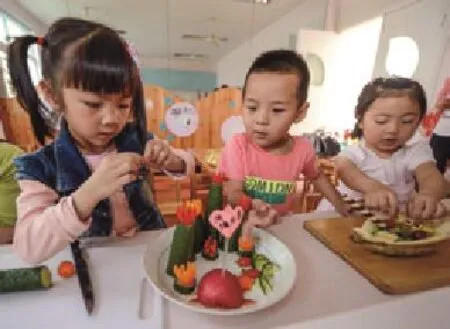Lonelier Than Ever
2013-06-07ParentsfacethechallengeofmakinggenerationofonlykidssociallyactiveByWangHairong
Parents face the challenge of making a generation of only kids socially active By Wang Hairong
Compared with children she taught a decade ago, or even a few years ago, Zhang Jing, a kindergarten teacher of nearly 20 years in southwest China’s Chongqing, says kids nowadays are less independent and poorer at interpersonal skills.
Zhang said that more than half of the children in her class cannot feed or dress themselves, and some children need teachers to coax them to sleep at nap time.
China’s post-80s generation has been a hot topic of discussion in the country. Most individuals in this cohort, now in their early 30s or late 20s, are the only children of their families due to China’s family planning policy. Doted on by parents and grandparents who revolved around them exclusively, they have been labeled as spoiled, self-centered, ill-mannered, maladjusted “little emperors” and have raised fears that they would be a “lost generation.”
Now, the post-80s generation has grown up and many are raising their own only children.A second generation of only children have neither siblings nor aunts, uncles or cousins, and worries abound that they could grow up lonely,which will likely impact their character and social skills.
Not all the problems of only children are caused by their singleton status; rather, some should be blamed on poor parenting, said Sun Yunxiao, Director of the China Youth and Children Research Center in Beijing.
Sun said that Chinese parents of postmillenials tend to spend too little time with their kids. They also neglect to tailor early education to children’s individual characteristics, and needlessly emphasize imparting knowledge over building character and fostering good habits.
Pampered children
Most children in Zhang’s kindergarten are taken care of by their grandparents.
Zhang said that she can tell whether a child is looked after by the grandparents. “Usually,children brought up by elders are less independent, irritable and weaker in language ability,”she said.
A survey conducted byWomen of Chinamagazine shows that 70 percent of children across the country are taken care of by their grandparents. Many elderly people,having gone through hardships when they were young, thought as life gets better, they should go all out to take good care of their grandchildren, said Xiong Bingqi, a wellknown educator and Deputy Director of the Beijing-based 21st Century Education Research Institute.
Eager-to-please grandparents give water to children before the young ones even feel thirsty, and they always keep a watchful eye on children during outdoor activities, forbidding them from taking any risks. Overprotective grandparents tend to produce selfish, wayward and excessively dependent children, said Sun Hongyan, a researcher with the China Youth and Children Research Center.
Sun said that if parents fail to establish close bonds with children before they reach 6 years old, children will more likely feel estranged from their parents and develop psychological problems.
Formulating remedies
Many parents of only children, having a good understanding of the kids’ solitude and the importance of emotional intelligence, try to make up for the relative isolation by fi nding playmates for their children.
Chen, a mother in Hangzhou in east China’s Zhejiang Province, enrolled her then 34-monthold son in fi ve early-education courses last fall.She said that her main purpose in doing so was to give her son an opportunity to see the outside world and play with other children, and was less concerned with how much knowledge he could intake.
“Now, only children enjoy their parents’company only after they get off work in the evening. They are too lonely,” Chen told zjnews.com.cn, a local news portal.
In the Xisanqi neighborhood of Beijing’s Haidian District, the mothers of a trio of 3-year-old boys often make appointments so that their sons can play in their residential compound together. In winter when it is too cold to stay outdoors for long, they bring their children together at a neighborhood recreational facility.
Some parents, who do not know their neighbors well, even look for companions for their children on the Internet. A netizen known as Zhuoyue in Xi’an in northwest China’s Shaanxi Province is one of them.She said although she herself is also an only child, when she was young, she still had cousins to play with. Now her daughter, who has no siblings or cousins, usually plays alone. Zhuoyue worries if this situation persists, her daughter will have trouble communicating with others.

EARLY START: Toddlers, accompanied by their caretakers,learn to cross the road at an early-education center in Tianjin on May 8, 2012

LEARN TO LOVE: Children in Xiangfu Art Kindergarten in Hangzhou, Zhejiang Province, learn to prepare food for their mothers on May 10
Early-education frenzy
Leaving their offspring to their parents does not mean that the post-80s have neglected their kids’ education. On the contrary, fearful that their children might be left behind at the starting line, they are busy chauffeuring their progeny to various early-education classes,often at considerable expense.
When Lu Cong, a post-80s woman in Beijing, was expecting a baby, she was determined to give her child a carefree childhood.However, she changed her mind when the baby was barely 6 months old.
After she learned that most children in her neighborhood had taken some early-education classes, Lu worried that her child’s intellectual development would suffer.
Parents send their children to training classes on a variety of subjects, such as painting, singing, dancing, piano playing,skating, English language learning and martial arts. This March, a 6-year-old’s online resume grabbed much attention with claims that the kindergartener can write more than 300 Chinese characters and can add and subtract double-digit numbers.
Besides regular kindergarten classes, the child has completed English language courses in a well-known early-education institution and piano lessons from music teachers of a top music conservatory. Every day, the child plays piano for at least half an hour.The child, also good at sports, has practiced martial arts in a renowned sports school in Beijing and received professional training in roller skating. The kid has won prizes in ice hockey and martial arts competitions.
While parents attach great importance to their children’s intellectual development, some have not paid enough attention to their moral education.
The Shanghai Women’s Federation once surveyed the parents of 1,054 minors on domestic educational priorities. Among them,80 percent of responding families focused on imparting knowledge. For 64 percent of families, physical education was given importance. Only 54 percent of families said they considered moral education to be a major priority.
“Family education is important in building character and cultivating manners,” said Xie Boyu, a teacher at No.2 Kindergarten in Wuhai City, north China’s Inner Mongolia Autonomous Region.
“Now families hover around children, which contradicts China’s traditional reverence for seniority. If a family fawns too much attention to the child fi rst rather than its elders, over time,the child will become selfish, and will not be sensitive to the feelings of others.”
